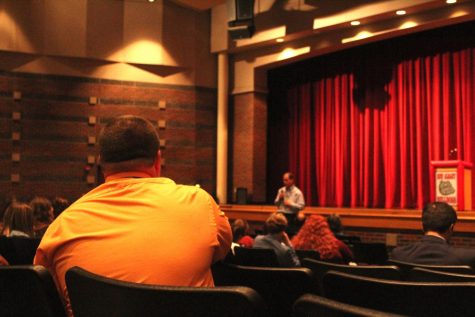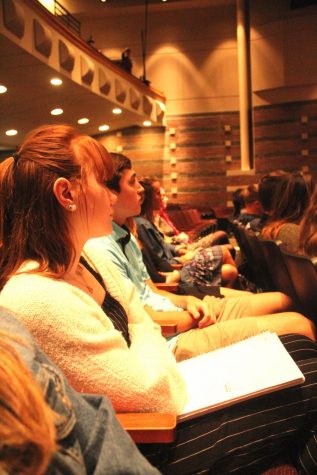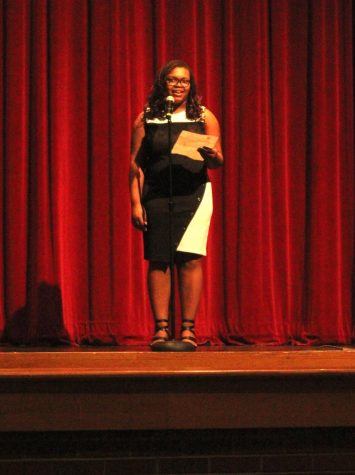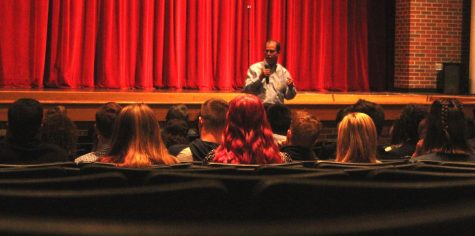Rare opportunities for AP Government students
Politicians from Washington come to inspire and enlighten seniors
Senator Mike Braun stands in front of the 69 AP Government seniors attending the event after being walked down by 4 students, principal Dr. Ginkins, teacher Pierce Mumaw, and administrator Jamie Crick.
November 7, 2019
Being able to meet and chat with a U.S. senator is not something every high school student can say they did, but AP Government teacher Pierce Mumaw is making these kinds of visits from Junior Senator Mike Braun a reality for the seniors in his first, second, and sixth periods.
“I think inviting members of Congress and other officials to our school makes the topics that we discuss in class more relevant,” Mumaw said. “I can lecture students all day about how the Senate works and how politicians view a certain topic, but when a Senator or Representative speaks about these topics, students seem to listen a little more.”

Having government officials speak to high school students has helped many seniors better understand who exactly is representing their home state in the capitol, says senior Amber Heiskell.
“It’s really cool [that they visit] because I’ve heard the names and seen the faces on TV, but haven’t seen a whole lot of what they talk about and the issues they care about, and what their quota or their agenda is,” Heiskell said. “We mostly just talk about what they do in class and their job description, and then the media will sometimes twist politician’s words or doesn’t represent them to their truest self, so them coming in to speak, without any middleman, we can see exactly what they believe in and who they really are.”
Senator Braun made it a point to start the discussion by giving some information about himself, where he comes from, all that he’s done for the Indiana community, and how he still represents us and preaches for us in the capitol. Seniors Riley Winslow and Madison Lawson believe he did a great job of presenting himself.

“I didn’t quite know what to expect,” Lawson said. “I didn’t know if he would speak with more of a political or personal attitude. But after he started,, it became clear he wanted to relate to us as students.”
“I liked that he came down to speak to us,” Winslow said. “He wanted to be on our level. He treated us like educated adults, he answered our questions as best he could, and was very honest about where he stands in his values/views. I noticed he was monotone, but he was still more engaged in what we were going through and what’s to come for us. This man actually seemed like a real person and not just a self-serving politician. He didn’t speak far over our heads or boast about himself or his achievements, which I liked.”
The learning experience Mumaw sought to provide his students proved successful with senior Matthew Sozzi.
“I learned more about the intensity of what it’s like to be a senator,” Sozzi said. “In addition, I learned the importance of senators and their role in our government. They are truly the individuals who represent our thoughts, beliefs and ideas through their voting choices as well as their role in legislation. Every single one of their votes counts, because it represents ours.”

Young voter turnout has proven time and time again to be lower than what should be the case, according to Mumaw, with only 36 percent of registered young voter turnout last 2016 presidential election.
“I think American voter turnout is very sad,” Mumaw said. “It is a privilege to be able to vote, but is also a great responsibility. All Americans should consider the importance of voting. Besides, if you don’t vote, I don’t think you have the right to complain. I hear students say all the time that politicians are old and don’t understand the lives of young people. Well, the only way to change that and elect members of Congress who are younger is for young people to participate and vote.”
AP Government students met Representative Trey Hollingsworth a few weeks ago and agree with Mumaw.
“I believe everyone should become educated enough to be knowledgeable of their views, rather than allowing the media to tell us what to believe,” Sozzi said.
“Many young voters don’t vote because they don’t feel that their vote matters but really it does,” Winslow said. “We need young voters to educate themselves and choose who is in charge because they’re the same ones who complain but don’t tend to exercise their rights to make a difference. Educating ourselves on candidates is important, and I’m making

sure to not do so purely on social media. Media can be misleading; they show what they want you to see or only bash others, but actually googling what these people represent and preach for and listening on the live, aired news would be beneficial in changing this problem America has.”


